Khartoum - update
Still camped in Khartoum, we were able to see the Friday prayer ceremony at the Hamed el-Nil Mosque in Omdurman.
This is preceeded for some hours by singing in the Mosque, and then for even more hours, until sunset, with an intense ceremony of drumming, chanting and trance-inducing dance by the participants on the large and dusty forecourt. This includes some of what is usually referred to as 'Whirling', but this is only a small part of the proceedings, and no one wears those classic white voluminous robes normally associated with 'the Whirling Dervishes'.
The participants are from Nubia (the north of Sudan and the south of Egypt), and are in groups of about twenty or more. Each group is dressed in a different design of colourful Arabic robes and comes under the tutelage of a master. He leads and encourages his group in the ever more intense chanting and dancing to the never-ending rhythmic drumming of a large band of percussionists.
Quite an experience to be standing right on the edge of it all.
The many spectators watch in a circle surrounding all the groups. As the proceedings become more and more intense the participants need more and more room, so we get gently and politely shoved outwards until we're right at the edge of the huge forecourt, dodging around trees and lamposts.
There aren't many foreigners amongst the spectators, so we are noticeable and receive warm welcomes from the organisers and leaders.
And from the children.
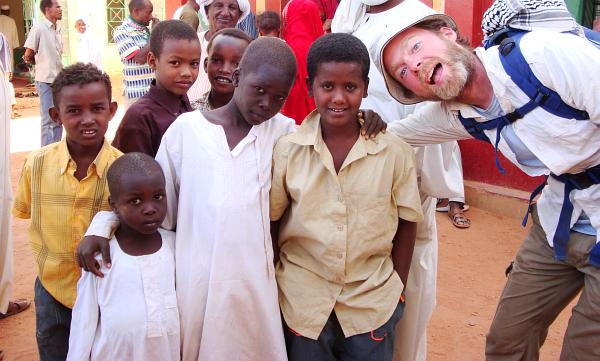
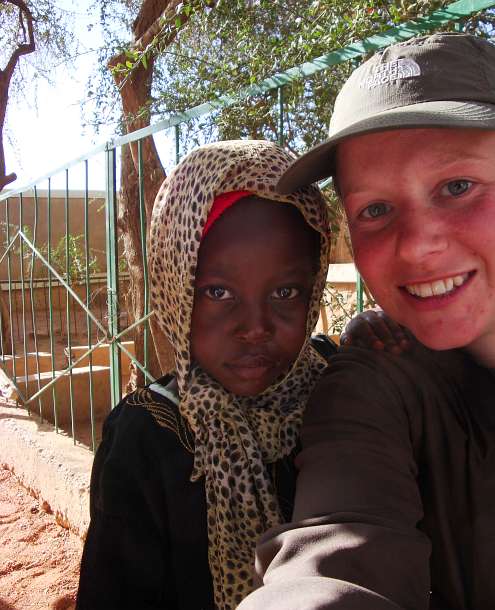
The groups arrive and take their places.
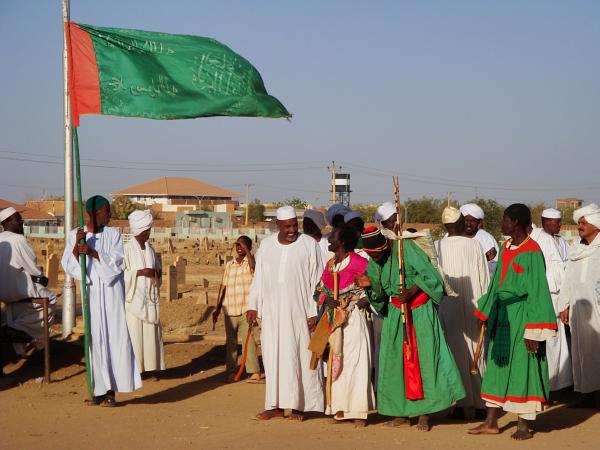
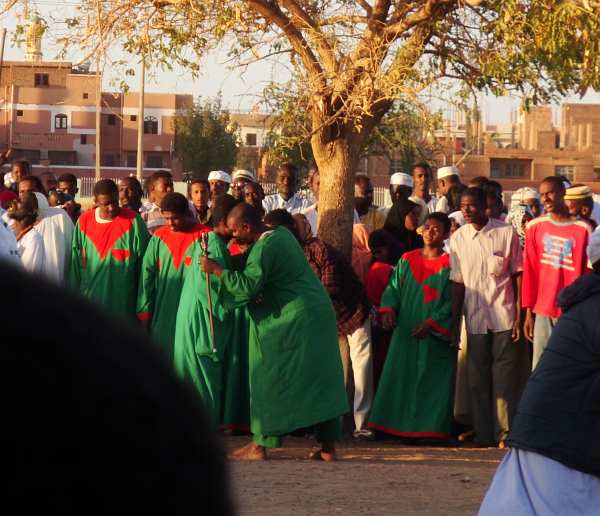
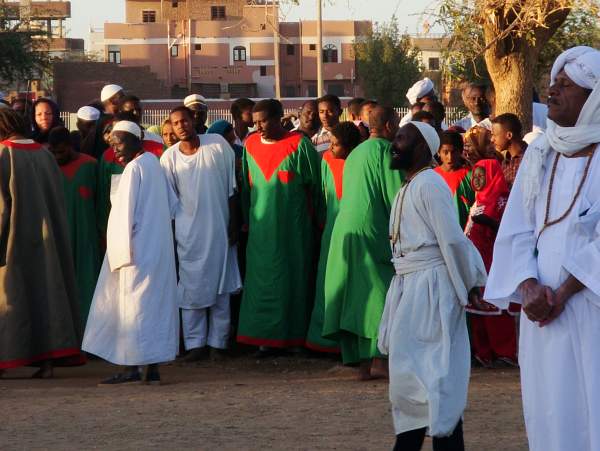
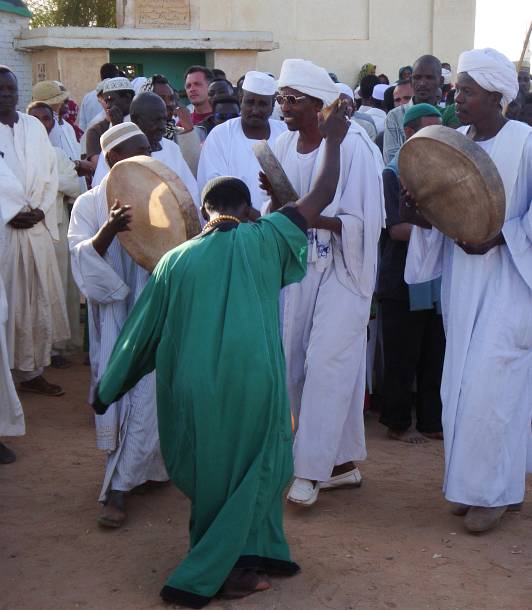
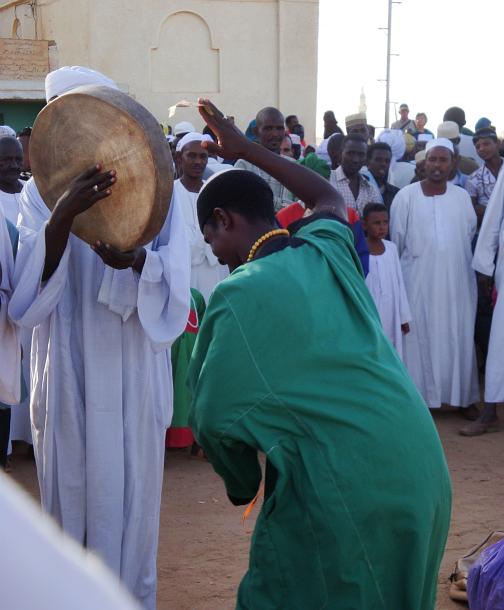
And a note about Sudan and its people.
It's certainly a desert country here, even the Nile doesn't irrigate much land either side of the banks.
So it's incredibly dry and dusty. Drinking water consumption goes up enormously compared to Egypt.
And the dust is everywhere.
I sat in a Khartoum restaurant the other day and watched the main industry going on in the street outside.
Car washing.
It's done everywhere, most street corners, any place where cars can be left without blocking traffic too much.
A big section of the road outside the Sailing Club is used for car washing.
All done by hand, usually by two people at a time, with bucket and cloth.
And, they are meticulous about washing the tyres. Sidewalls, treads, and everything else that can be reached by hand under the wheelarch.
Then when all is done, they remove the spare wheel and wash that as well!
And the people are very different from those of Egypt.
The same friendliness is everywhere, the same "Welcome!" from everyone in the street as you walk along.
The same desire to help wherever possible, and eagerness to practise English.
But without any of the pushiness found in Egypt. The intense Egyptian desire to sell any tourist anything at any price, and anger, faint or otherwise, when the answer is "No!"
Nor the insistance of accepting hospitality.
In comparison, the Sudanese seem to be very happy and serene and relaxed people. They have no desire to push themselves or their hospitality or their merchandise upon you. And always smiling and waving, wanting to know what country you are from and always thanking you for being in their country. And often wanting to know what sort of time you are having.
I would definitely recommend Khartoum to anyone wanting a holiday in an African city. It really is very easy-going.
And the winter climate is pretty good too (summer, pretty hot). Very dry, just a bit too hot some days in the afternoon - for changing tyres.
It also, it seems, has a reputation, away from the unfortunate areas of trouble that tourists can't get to anyway, of being one of the safest of African countries.
The Sailing Club is THE place where overland travellers stay in Khartoum, nearly all of them on the Cairo to Cape Town route or vice versa.
(Except a young couple just arrived this morning on bicycles, travelling from Djibouti to Cairo on a Round-the-World cycle trip).
So we have been meeting many other Cape Town travellers, going either north or south.
Those going north have been an excellent source of information for us, while quizzing us on our experiences in Egypt and the Middle East at the same time.
We have found that their stories about the two major aspects of the next stage of our journey, the people of Ethiopia and the notorious Moyale to Marsabit road of northern Kenya, have been dependent almost entirely on their own personal outlook and attitude.
Those of a positive frame of mind say the Ethiopians are an outgoing and demanding people appreciating instant contact with visitors, a ready smile and wave, and the chance to practice their English. "Wave to them straightaway, say 'No' to their demands positively and with a smile, and say something else."
Others say they are difficult, very demanding of 'gifts' and money, and aggressive if the verbal contact is insufficient to exercise their English.
Similarly with the condition of the road. Some say it's a chassis or frame-breaker, torture, and dangerous. Others, that ordinary vehicles and ordinary buses do it with no problems, take your time, your bikes will be fine.
A typical story is that of an English couple recently heading north from Nairobi. At the start of the problematic road the gearbox broke on their Volkswagen campervan. For whatever reason they abandoned their journey and donated the immobile van to some local people working for an NGO voluntary organisation. Two days later the van arrived at the Kenya/Ethiopia border, fixed and perfectly capable of negotiating the road in a pretty quick time.
So we continue our preparations here for the next couple of days. The next major stop will be Addis Ababa, maybe about two weeks, no internet till then.
